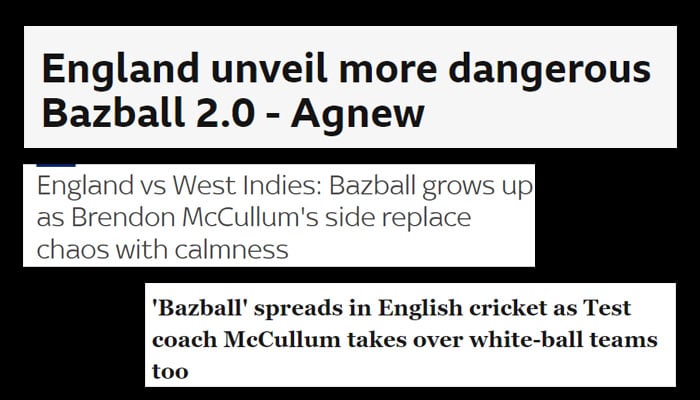If you’ve been following cricket over the past two years, you’ve likely come across a new term, “Bazball,” especially associated with the England cricket team.
England is set to arrive in Pakistan to play a three-match Test series, with the first match scheduled to be held in Multan on October 7. This series marks England’s return to Pakistan after their 2022 tour, where they dominated the hosts with an emphatic 3-0 whitewash.
During that 2022 series, England adopted an aggressive approach, shattering a 112-year-old record by scoring a staggering 506 runs on the opening day of the Rawalpindi Test, the highest first-day total in the history of Test cricket.

Over the past two years, England has gained a reputation for playing “Bazball” cricket. Whether on social media or in headlines, this term has become synonymous with their style of play.
But what exactly does “Bazball” mean? The essence of Bazball lies in scoring quick runs with the intent to win Test matches. Under head coach Brendon McCullum, England has introduced a new philosophy in Test cricket, one that challenges the traditional, slower style of play.
In 2022, the England and Wales Cricket Board (ECB) appointed McCullum as the head coach and Ben Stokes as captain, ushering in a new era for the England Test team. They quickly adopted an aggressive game plan, completely transforming the way Test cricket is played. Instead of the traditional slow pace, England’s batsmen started scoring at a rapid rate, often achieving run rates of 4 to 5 runs per over and even putting up totals of 500 runs in a single day.

This shift in approach can be credited largely to McCullum, who was known for his attacking style during his own playing days. Fondly called “Baz,” McCullum’s influence on England’s Test team led to the birth of “Bazball,” a term that has since become a staple in the cricketing lexicon.
The term “Bazball” was coined by ESPNcricinfo editor Andrew Miller during a podcast in 2022, following the rise of England’s aggressive brand of cricket under McCullum’s guidance. Since then, the term has been widely used to describe England’s new, high-octane approach to the longest format of the game.
